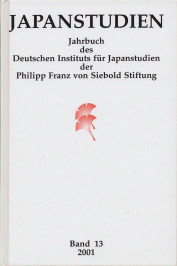
Details
2001, ISBN 3-89129-376-3, € 82,00, iudicium Verlag, München, 539 p., hardcover [Order]Authors
Conrad, Harald
Japanstudien 13
Wohnen in Japan: Markt, Lebensformen, Nachbarschaft

Volume 13 (2001) of the DIJ yearbook Japanstudien focuses on the topic “Living Conditions in Japan: Markets, Lifestyles, Forms of Dwelling”. Housing and living conditions not only reflect basic human needs, they also are an expression for the complex and varied lifestyles in a society and culture. Economic, social, demographic and environmental developments have brought along significant changes in terms of lifestyles and forms of dwelling – changes, which are receiving growing academic attention and are reflected, for instance, in the increase of research in the field of urban studies. The eight contributions in volume 13 of Japanstudien relating to the major topic discuss such questions from a multi- and inter-disciplinary perspective and approach a wide range of issues related to changing forms of living and lifestyles in Japan. Moreover, Japanstudien includes five articles on various other topics, as well as ten book reviews of German, English and Japanese publications.
Content
Vorwort [Foreword]
p. 11-13
Wohnen in Japan: Markt, Lebensformen, Wohnverhältnisse [Living Conditions in Japan: Markets, Lifestyles, Forms of Dwelling]
p.13-44
Nation, Modernity and Interior Decoration: Uncanny Designs in the 1922 Peace Commemoration Tōkyō Exposition Culture Village Houses
p.49-87
Wohnverhältnisse der städtischen Mittelschicht 1905–1970: Bilder und Wirklichkeiten [Living Conditions of the Urban Middle Class 1905–1970: Ideal and Realities]
p.89-151
Machiya vs. manshon: Notizen vom Kyōtoer Häuserkampf [Machiya vs. manshon: Analyzing Kyōto’s Townscape Disputes]
p.153-192
Anders Wohnen auf der Etage – neue Entwicklungen im japanischen Wohnungsbau [‘Living Differently’: New Trends in Japanese Apartment Development]
p.193-220
Toshikeikaku and Machizukuri in Japanese Urban Planning: The Reconstruction of Inner City Neighborhoods in Kōbe
p.221-252
Singles in Japan: Motor gesellschaftlicher Veränderungen, Protagonisten neuer Lebensformen? [Singles in Japan: Engines of Social Change and Protagonists of New Forms of Living and Dwelling?]
p.253-284
Urban Development and Financial Centers in the Global Economy: Tōkyō, Frankfurt and New York
p.285-316
Alle Macht dem Volk? Das direktdemokratische Instrument als Chance für das politische System Japans [“All Power to the People”? The Direct Democracy as a Chance for Japan’s Political System]
pp. 319-342
A Comparative Analysis of the Japanese and the German Public Banking Systems
p.343-372
Neubewertung der Kernenergie in Japan zu Beginn des 21. Jahrhunderts? [Reconsidering Japan’s Nuclear Policy at the Beginning of the 21st Century]
p.373-410
Die soziale Konstruktion des japanischen Reisemarktes in der Edo-Zeit [The Social Construction of the Japanese Travel Market During the Edo Period]
p.411-436
Anmerkungen zu Yamana Jirō (1864–1957) und seinem Konzept der „Gesellschaftserziehung“ [Notes Concerning Yamana Jirō (1864–1957) and his Concept of “Social Education”]
p. 437-451
Hohn, Uta: Stadtplanung in Japan: Geschichte - Recht - Praxis - Theorie. Dortmund: Dortmunder Vertrieb für Bau- und Planungsliteratur, 2000. 616 S., DM 168,-
p.455-462
Hohn, Uta: Stadtplanung in Japan: Geschichte - Recht - Praxis - Theorie. Dortmund: Dortmunder Vertrieb für Bau- und Planungsliteratur, 2000. 616 S., DM 168,-
p.463-468
Gilman, Theodore J.: No Miracles Here. Fighting Urban Decline in Japan and the United States. Albany: State University of New York Press, 2001. 208 S., US$ 19,95
p.469-474
Barrett, David P. und Larry N. Shyu (Hg.): Chinese Collaboration with Japan, 1932-1945. The Limits of Accomodation. Stanford: Stanford University Press, 2001. xiv+290 S., US$ 45,-
p.475-480
Suzuki Takao: Nihonjin wa naze eigo ga dekinai ka [Warum können die Japaner kein Englisch?]. Tokyo: Iwanami Shoten, 1999 (Iwanami Shinsho. Bd. 622). iii+216 S.
Suzuki Takao: Eigo wa iranai!? [Englisch brauchen wir nicht!?]. Tokyo: PHP Kenkyūjo, 2001 (PHP Shinsho, Bd. 136). 207 S.
p.480-489
Phillipps, Susanne: Tezuka Osamu: Figuren, Themen und Erzählstruktur im Manga-Gesamtwerk. München: iudicium, 2000 (Iaponia insula, Bd. 9). 433 S., DM 70,-
p.490-496
岩渕功一:『トランスナショナル・ジャパン アジアをつなぐポピュラー文化』[Transnational Japan. Die Populärkultur, die Asien miteinander verbindet]東京:岩波書店 2001, 334 S. (+24 S. Literaturverzeichnis). ¥2800
p.496-502
日本国語大辞典 第二版 編集委員会・小学館国語辞典編集部編『国語大辞典 第二版』[Das große Wörterbuch der japanischen Sprache - Zweite Auflage]東京:小学館 2000-2001、13巻.¥195.000
p.503-507
Kracht, Klaus und Markus Rüttermann (Hg.): Grundriß der Japanologie. (IZUMI. Quellen, Studien und Materialien zur Kultur Japans ; 7) Wiesbaden: Harrassowitz, 2001, 650 S., DM 58,-
p. 508–516
Porter, Michael E.; Takeuchi, Hirotaka; Sakakibara, Mariko: Can Japan Compete? New York: Oxford University Press, 2000. 208 S., US$ 27,50
p. 517-523
Lone, Stewart: Army, Empire and Politics in Meiji Japan. The Three Careers of General Katsura Tarō. New York: St. Martin's Press, 2000. vii+247 S., US$ 65,-
p. 524-530